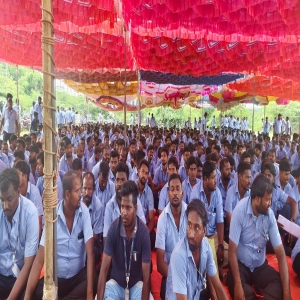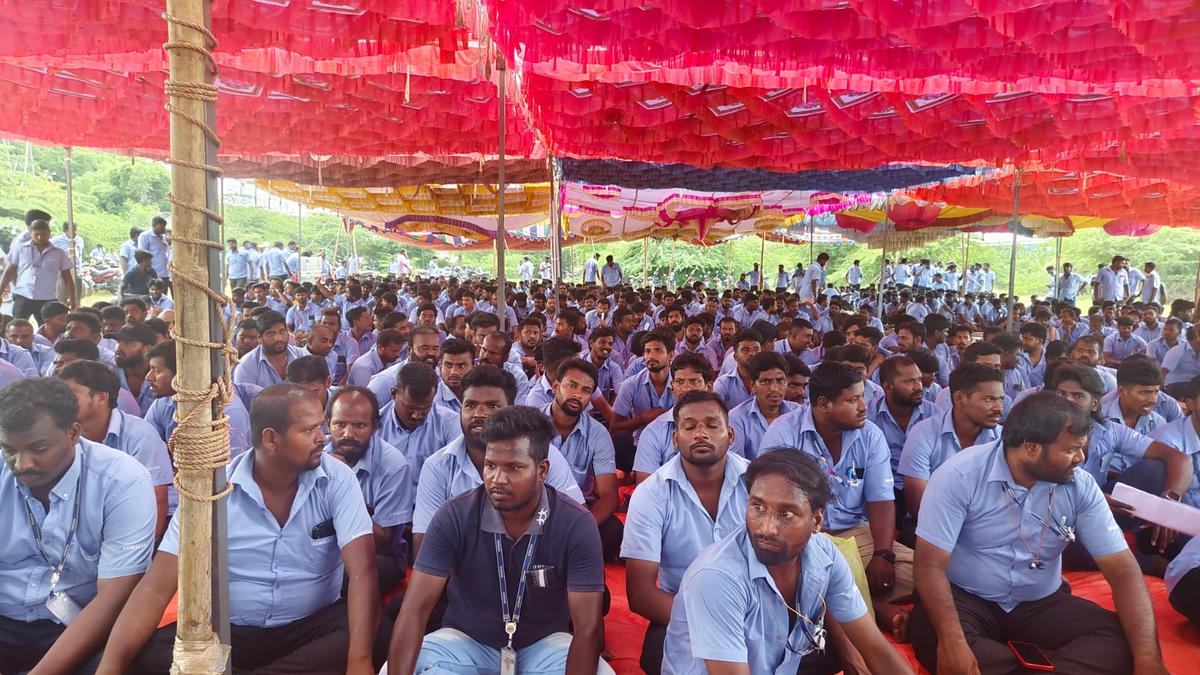
.jpg) Jose Vattakuzhy
Jose Vattakuzhy

Trade unions are indispensable entities in industrial relations. In order to maintain justice and equity in employment situations, trade unions have historically fought against exploitation and arbitrariness, secured better working and living conditions, and protected jobs and actual incomes. Following a lengthy history of union activism, it acquired benefits under collective bargaining agreements, several laws and industrial jurisprudence. Those initiatives have resulted in the growth of even numerous social organisations. However, today, it seems India's labour unions are at a crossroads in the background of recent developments in the labour market.
Among them, of late, the chairman of Tubro and Larsen has stated that he would like to extend the workweek to ninety hours. It was a repetition of an earlier statement by Infosys CEO, NR Narayan Murthy, who emphasised the necessity of regulatory actions to raise working hours to 70 hours per week. It indicates that India has incubated one of the most thriving corporate ecosystems in the world, wherein the corporate messiahs are actively conspiring with the corporate-communal tyranny in governance by the current union government, and there is a fierce rivalry among them to wash away the blood and sweat of Indian workers.
Another fact is that the recently passed Industrial Relations Code 2020 appears to be a proposal to move towards "one trade union culture in the labour market." IRC 2020 Section 14(3) easily provides for encouraging a single bargaining agent in the backdrop of political influence on trade union activism. This section of the code purveys the government to recognise a union with a membership of at least 51% of the workers on the muster roll of the industrial establishment as the exclusive bargaining agent and negotiating union if there are multiple trade unions operating in that establishment. It implies that other smaller trade unions will become obsolete if there is only one large trade union since the company will not acknowledge them.
Many labour unions in India have close political ties, some even connected to ruling political parties. Consequently, the IRC 2020 proviso would lead to charges that the unions prioritised their political objectives over the welfare of their members and democratic values.
Furthermore, India's trade union movement is extremely dispersed, with multiple unions frequently representing the same employees. Because of this fragmentation, it is more difficult for unions to put up a united front, which also weakens their bargaining power. These divisions, which can be caused by ideological disagreements, political connections, and conflicting leadership objectives, weaken the collective strength of the labour movement.
Consequently, collective bargaining will remain worryingly unitary as the big union will be the sole bargaining agent in all bipartite and tripartite talks, and smaller trade unions will not get the opportunity to grow, prosper and protect workers' rights through their rights of representation in any important forums.
The 37-day strike by workers at Samsung Electronics' Sriperumbudur, Tamil Nadu, Unit was put off last year, but the primary demand for the firm to formally recognise their union is still pending in court. As part of the settlement, both parties committed to waiting for the court's ruling about union recognition despite the workers having the constitutional right to form an association under Article 19(1).
Another factor that has to be noticed here is that memberships in trade unions are decreasing and that verification of unions' membership is not being conducted regularly. The general verification of membership of Trade Unions affiliated with Central Trade Union Organisations (CTUO) is an important exercise undertaken by the Ministry of Labour and Employment. General verification aims to determine the representation of CTUOs in various national and international councils, committees, conferences, etc. The most recent verification in India was carried out in 2002, and the Ministry released the findings in 2008. The most recent data, released in 2012, indicated that there were 16,154 trade unions with a total membership of 9.18 million (91 lakhs and 80 thousand), while there were 593.23 million (59 crore, 32 lakh and 30 thousand) labourers in the nation, of whom 89% were employed in the informal sector.
And again, today, the number of people joining trade unions has declined. According to recent research, only 2% of the working class has been subject to a system of collective bargaining power, and the majority of respondents, or 61%, thought that trade unions were only somewhat stronger. Additionally, union officials at all levels are becoming less confident in union operations. None of the recent initiatives to increase productivity and efficiency were developed by unions.
The nation has been experiencing significant industrial unrest in both the public and commercial sectors over the past 20 years, and studies have also shown a negative correlation between unions and economic performance.
Over the past few decades, India's economy has experienced a dramatic change, moving from a predominantly agrarian one to an increasingly industrialised and service-oriented one. As a result, sectors like IT, services, and gig work have increased while traditional industries and manufacturing sectors, which served as the foundation of the labour movement, have decreased. It is now challenging for trade unions to organise and represent employees in these emerging, frequently unregulated industries.
India's economy has grown impressively, but inequality and pay gaps have increased. There is growing pressure on unions to address these problems by promoting improved pay, benefits, and working conditions. The bargaining power of unions is further weakened by the fact that many industries are pursuing cost-cutting strategies, such as laying off permanent employees and substituting them with contract workers.
In the final analysis, the Labour Rights Index 2024 (LRI 2024) report, which examined the economies of 145 nations, was based on a worker's working lifespan. According to LRI, India has limited access to good jobs, with overall scores of 67, 65, and 65 in 2020, 2022, and 2024, respectively. The Indian position on freedom of association, as quoted by LRI, is 25.
Clearly, Indian trade unions are at a turning point. To effectively and successfully represent a workforce that is growing increasingly diverse, distributed, and influenced by global and technological factors, the unions must figure out how to stay relevant and successful. Indian trade unions' survival at this critical juncture would depend on their capacity to adapt, reform, and respond to the opportunities and challenges presented by these developments.
The future of trade unions is as uncertain as the future of work. Globalisation and changes in the population, environment, and technology will shape the employment markets of today and tomorrow. Therefore, trade unions must discover creative ways to connect with new members and support crisis solutions through social conversation.